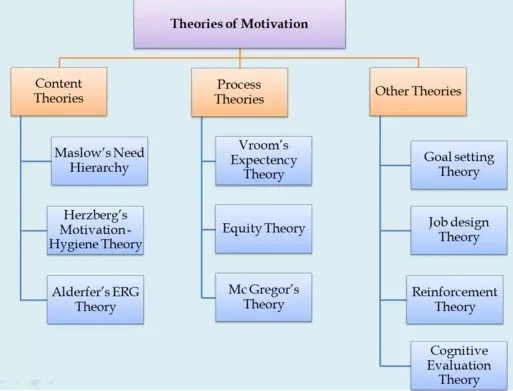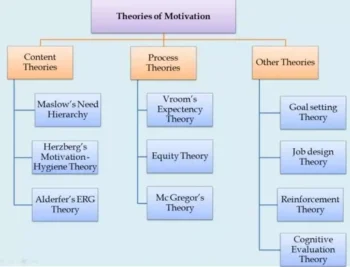Table of Contents:-
- Theories of Motivation
- Content Theories of Motivation
- Process Theories of Motivation
- Other Theories of Motivation
- Drive Reduction Theory
- The Optimal Arousal Theory
- Incentive Theories of Motivation
- Cognitive Approaches to Motivation
- McClelland’s Acquired Needs Theory
Theories of Motivation
Theories of motivation provide a detailed framework to understand the various factors that drive the performance and behaviour of people. There is no shortage of models, strategies and tactics for motivating employees; as a result, firms constantly experiment with new motivational programmes and practices. By understanding and applying these theories to the real world in the workplace, managers can create a positive environment that encourages employees to reach their full potential.
Motivational theories can be classified into the following categories:
1) Content Theories
Content theories attempt to explain those particular things that truly motivate a person at work. These theories are concerned with identifying people’s needs their relative strengths, and the goals they seek to satisfy the needs. Content theories emphasize the nature of needs and what motivates them. There is the assumption that everyone reacts in much the same way to motivating pressures and that there is, therefore, one best way to motivate everyone. These theories provide a prescriptive list that managers can follow in an attempt to increase productivity.
The most common content theories of motivation are:
- Maslow’s Need Hierarchy Theory,
- Herzberg’s Motivation Hygiene Theory, and
- Alderfer’s ERG Theory.
2) Process Theories
Content theories of motivation try to answer the question ‘What motivates people?’ while process theories attempt to answer the question ‘how motivation takes place within an individual?’. Process theories change the emphasis from needs to the goals and methods by which people are motivated. These theories identify the processes by which internal factors influence motivation. These theories are cognitive, i.e., they are based on the premise that motivation is a function of employees’ perceptions, thoughts, and beliefs. They attempt to describe and explain how people sustain, start, and direct behaviour aimed at the satisfaction of needs or reduction of inner tension.
The most common process theories of motivation are:
- Vroom’s Expectancy Theory
- Equity Theory,
- McGregor’s theory X and Y
3) Other Theories
Apart from these theories, there are several other theories like goal-setting theory, job design theory, reinforcement theory, cognitive evaluation theory, etc.

Let us now discuss the various theories of motivation that help explain how motivation functions and operates to influence individual behaviour and actions:
Drive Reduction Theory
This theory focuses on needs and drives, as discussed earlier. Also known as the push theory of motivation, it posits that “behaviour is pushed towards goals by driving force within the person or animal” (Morgan et al., 1996, p. 269).
The theory states that the “lack of some basic biological need produces a drive to push an organism to satisfy that need” (Feldman, 2015, p. 288). As explained earlier in this unit, a drive is a tension or arousal that directs behaviour to fulfil a need. Drives can be classified as primary (e.g., thirst, hunger, sleep, and sex) related to physiological needs and secondary, acquired from experience and learning (e.g., the need for achievement in one’s work).
A crucial concept in Drive theory is homeostasis, defined as “the process by which all organisms work to maintain physiological equilibrium or balance around an optimal set point” (Feist & Rosenberg, 2015, p. 398). Homeostasis reflects the body’s tendency to maintain a balanced or steady internal state (Feldman, 2015). When there is any deviation from the ideal state or set point, the body adjusts to restore balance.
For example, thirst as a primary drive disrupts homeostasis, prompting the action of drinking water to restore balance. While Drive Reduction Theory effectively explains behaviours guided by direct drives, it falls short of elucidating all human motivations, such as arousal-seeking behaviour. It may not account for the actions of an adolescent enjoying a roller coaster ride or biking at full speed. This theory cannot fully explain behaviours driven by thrill and curiosity.
The Optimal Arousal Theory
The drive reduction theory fails to explain behaviours associated with curiosity or thrill-seeking. In such instances, the optimal arousal theory aids in understanding the need for stimulation. This theory posits that optimal arousal levels enhance performance and effective functioning. The Yerkes-Dodson law, established by Yerkes and Dodson in 1908, underlies this theory and elucidates the relationship between arousal levels and task performance (refer to Fig. 9aF) by stating that individuals perform best when moderately aroused or energized, with both low and high arousal levels resulting in poor performance (Feist & Rosenberg, 2015, p. 399).
As depicted in the figure, low or high arousal corresponds to low performance, while an optimal level of arousal results in high performance. Consequently, individuals are motivated when situations provide a moderate level of stimulation.
Two key considerations in the context of the Yerkes-Dodson law are individual differences in arousal levels and the task’s difficulty level. First, concerning the optimal arousal level for improved functioning or performance, it is essential to recognize that this level may vary from person to person, being individual-specific and lacking a fixed optimum. Second, the task’s difficulty level moderates the relationship between arousal and task performance. According to the Yerkes-Dodson law, more straightforward tasks require a higher arousal level for better performance, while more challenging tasks necessitate a lower arousal level for optimal performance.
Incentive Theories of Motivation
Also referred to as ‘pull’ theories (Morgan et al., 1996), these theories posit that motivation stems from the desire to attain external rewards or incentives. For instance, a child might be motivated to complete homework on time by the incentive of receiving chocolate, even if not hungry at the moment. Therefore, incentive theories elucidate behaviour in terms of external stimuli possessing rewarding value.
The drive reduction model and incentive theories are relevant and can be considered in tandem to explain what motivates specific behaviours. For example, when experiencing hunger, an individual will seek food (as per the drive reduction model), but the food choice may be influenced by its appetizing or appealing qualities.
However, incentive theories fall short of explaining all human motivation, mainly when individuals engage in behaviour without any apparent external incentive.
Cognitive Approaches to Motivation
This approach posits that “motivation is a result of people’s thoughts, beliefs, expectations, and goals” (Feldman, 2015, p. 289). Therefore, a student’s motivation to study for an examination is influenced by their expectations regarding whether studying will result in good marks.
This theory also aids in distinguishing between intrinsic and extrinsic motivation. Individuals are more inclined to engage in a specific task or work towards a particular goal when intrinsically motivated instead of extrinsically motivated. Moreover, attempts to enhance extrinsic motivation may inadvertently lead to decreased intrinsic motivation (Feldman, 2015).
McClelland’s Acquired Needs Theory
McClelland’s Acquired Needs Theory, developed by David McClelland, emphasizes three psychological needs:
- Achievement,
- Affiliation, and
- Power
Need for Achievement (nAch): This refers to the need to excel or achieve. Individuals with a high need for achievement exhibit a strong desire to master skills and attain success. They seek challenges, enjoy competition, and are motivated to overcome obstacles and difficulties.
Need for Affiliation (nAff): This pertains to the need for interpersonal relationships. Individuals with a high need for affiliation desire close and intimate connections. They are social, well-liked by their peers, and thrive in team and collaborative settings.
Need for Power (nPow): This relates to the need for influence, impact, and control over others. Individuals with a high need for power seek status and positions that confer influence, often manifested in material terms, such as wearing expensive clothing or jewellery.
Skinner’s Behaviorist Theory
Harvard University psychologist Professor Skinner (1953) introduced a new concept for motivating people, referred to as “behaviour technology,” “behaviour modification,” or “positive reinforcement.” Professor Skinner suggests that individuals perform better and experience greater psychological satisfaction in their jobs when they receive proper appreciation and praise for their excellent work.
These theories contribute to individual understanding of motivation by explaining the various psychological needs that drive human behaviour.
You May Also Like:-
Nature of Organisational Behaviour
Conceptual Foundation of Organisational Behaviour
Contributing Disciplines to organisational behaviour
Models of Organisational Behaviour
Approaches of Organisational Behaviour
Emotional Intelligence in Organisational behaviour
Factors Influencing Perception
Scope of Organisational Behaviour
Importance of Organisational Behaviour
Challenges and Opportunities of Organisational Behaviour
Factors affecting group behaviour
Causes of Conflict in an Organisation
Types of Conflict in an Organisation
Organisational Development Process
Factors Affecting Organisational Culture
